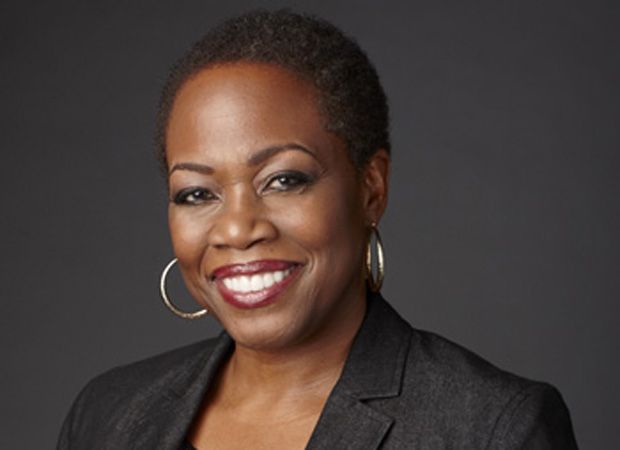Regina Taylor Opens a Digital Conversation About Race, Technology, and Our Lasting Legacy
Books are on the verge of extinction in ”stop. reset.”, Taylor’s futuristic drama at the Goodman Theatre.
Regina Taylor, a self-proclaimed bibliophile, found inspiration for her play stop. reset. when her local bookstore was forced out of business by the era of e-readers. The story, which follows an African-American book publisher made irrelevant by the digital age, opens at the Goodman Theatre later this month. Not only does the production commemorate her 20th year with the Chicago landmark, but it will also be the first mounting of stop. reset. since its world premiere at New York's Pershing Square Signature Center in 2013.
Apropos of the play's futuristic setting, Taylor is bringing 21st-century technology to the theatrical experience with in-theater tweeting, online community discussions, and digital contributions of work from local artists who care to comment on the play's hot-button topics. Taylor spoke with TheaterMania about the conversations it inspires — including the piece's commentary on modern culture, race, and the legacies we hope leave behind. Taylor herself has come around to the dark side of digital devices since the beginning of this project. Even so, she remains steadfast in her vow to keep her dusty old hardcopy books forever in hand.

How have you continued working to develop the play since its run at Signature Theatre?
I've been working on what I call the "portals of storytelling." Extending the story beyond the walls of the theater. Artists from different disciplines from music, to film, to spoken word, to dance are creating pieces off of the themes of the play that will then go on this microsite that the Goodman Theatre is building for stop. reset. People who may never be in the same room together normally are talking about how they've dealt with change in their fields: What they've learned, what they've had to learn, what they've had to let go. You have characters who have these arguments onstage in this fictional Chicago. We now see real people in Chicago having this same discussion. It's very exciting to me to have the walls brought down so I'm dealing directly with an audience who have become collaborators.
Are these conversations mostly concerned with technology?
It is about technology. I started out working on this play when my bookstore closed. I was thinking of what it would be like if I couldn't get my hands on a book easily, because it's part of my everyday ritual. That spurred me to think deeper about this moment in time — these times when we're facing astronomical change when it comes to technology and how that affects our everyday life. All of this ground is shifting. I'm very happy to be a writer at this point witnessing and trying to capture what's going on here. And we've already started the conversations. [Audiences] can choose to engage with the play before they get to the theater, they can engage with the play on this site and on their devices as they're in the theater, and that conversation continues both in live events and onsite.
As someone who at least began this process skeptical of the direction technology is taking us, how do you reconcile incorporating so much technology into the experience at stop. reset.?
I think theater is about connecting communities. From way back in the day when people gathered around the fire, you are bringing communities together to share stories to let us know that we're not alone. We have an opportunity now. There's a different perspective in terms of what a community is and how you connect communities. So I have been challenged to present different perspectives of that and to challenge audiences to choose how they want to enter. Some people will dive headlong into the unknown and some people speak about whether or not we should be tweeting in an audience.
What is your perspective on that debate?
I'm trying to present all sides. Certainly, I started this as more a purist. I like books. [laughs] Since I've started this journey I have become more open. Now I own a Kindle. I do my research on a device and I hold my books for pleasure.
Where do the conversations about race overlap with this technology discussion ?
[The] African-American perspective engages the social aspects of this technology. You can become anonymous — you can become whatever you want to online. And what does that mean in terms of social aspects? There could be an argument for the ability to blend, and there is the argument for holding on to one's history. That certainly is a dialogue that's happening. Right here right now you have millennials who feel that they have no use for history and you have die-hard folks who feel that their survival is about holding on to certain traditions. What we need to release in terms of being African-American in this digital age is a question of survival and extinction. Who are we going to become in a hundred years? What do we need to get to tomorrow?
Books are clearly very important to you. Is there one book that had a particularly significant impact on your life?
Many books have had huge affects on my life. Books that have saved my life…growing up as an African-American female at a period in time where people want to name you even before you're born. One of the most empowering things my mother gave me as a child: [I remember] being on the floor and creating children's books that had an African-American female at the center of it. It's where I started writing and loving books. It's not a narrative of victimization. It is empowering. You can write your own narrative. You plot that out in your imagination and you can fulfill certain things beyond other people's expectations.








